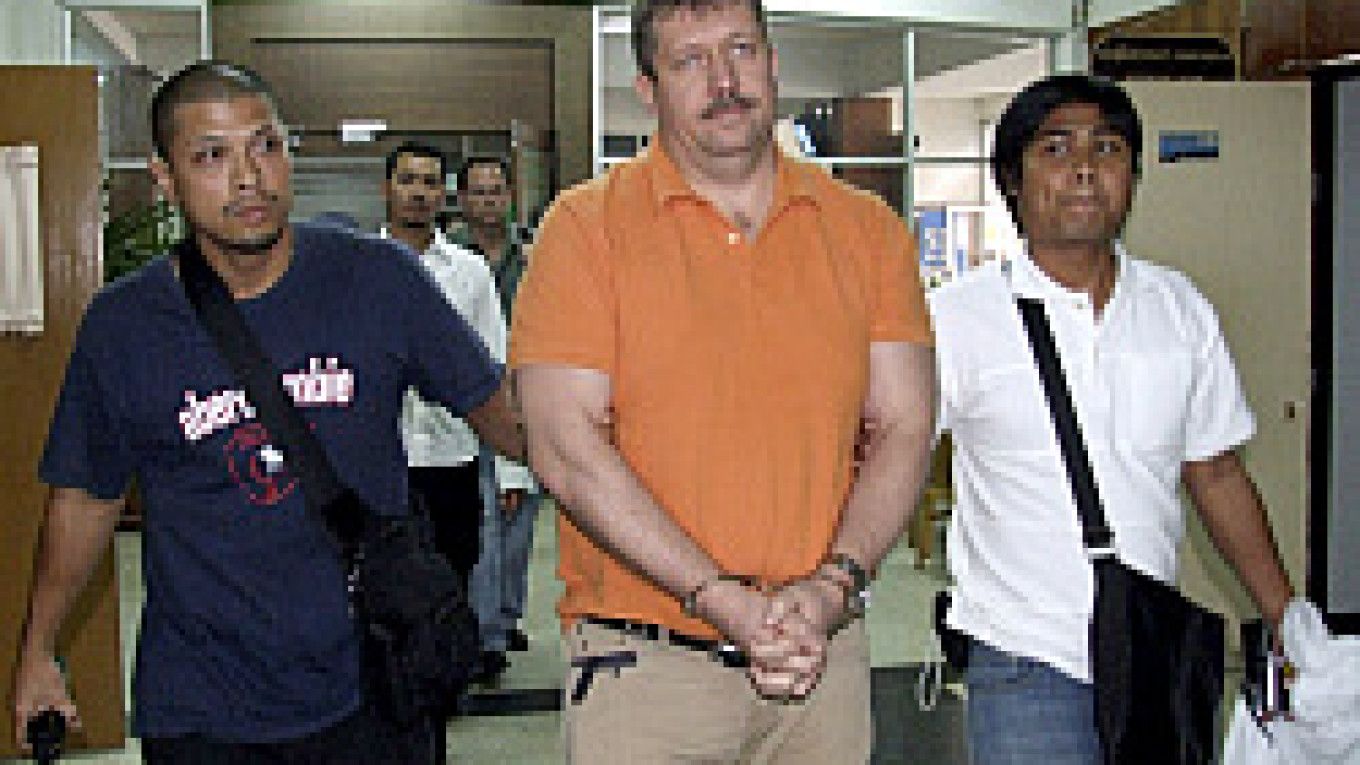Reputedly the model for Nicolas Cage's character in the 2005 film Lord of War, Bout, 41, has been accused of violating UN mandated arms embargoes by supplying weapons to African war zones and the Taliban, illicitly trading in diamonds and money laundering.
Pongpat Chayapan, head of Thailand's Crime Suppression Bureau, said Thursday that Bout had been arrested on a warrant issued by a Thai court, based on a request from the U.S. Drug Enforcement Administration, The Associated Press reported.
He said Bout would face criminal proceedings in Thailand and then be extradited to the United States.
Reuters, citing a report by Thai police, said Bout had come to Thailand on Feb. 29 "to procure weapons for Colombia's FARC rebels."
The 41-year-old owner of a private fleet of dozens of transport aircraft has had his assets frozen in the United States and is on Interpol's wanted list.
The Russian bureau of Interpol confirmed on Thursday that Bout had been on its list since February 2002, when Belgian police issued an international warrant, alleging that he was behind a scheme to launder the profits from sales of weapons in Africa.
A bureau official, speaking on the customary condition of anonymity, said that even if he had been arrested in Russia, Bout would not have been extradited to a third country.
The Russian authorities have not shown much interest in arresting Bout, who gave interviews at the Moscow offices of Ekho Moskvy radio and the Izvestia newspaper not long after the international warrant was issued.
Richard Chichakli, who described himself as Bout's friend, said Thursday that the DEA request "was very strange, because Bout has never been accused of having anything to do with drugs," and arms trafficking is the purview of another agency in the United States.
In April 2005, the U.S. Treasury identified Chichakli, a Syrian-born U.S. citizen, as Bout's U.S.-based chief financial officer and ordered the freezing of his assets.
 AP Viktor Bout under arrest in Thailand | |
"This is one way of not being so nice to Russia by someone in the U.S. administration," Chichakli said.
The DEA had not replied to a request for comment on the case by Thursday evening.
A native of Tajikistan and a military officer with a gift for languages, Bout got into the air-cargo business in the early 1990s, quickly building up a fleet of some 50 obsolete Soviet-era aircraft and a network of transport companies based in the Middle East, Africa, Eastern Europe and the United States.
UN arms experts and the U.S. government say Bout used his planes to supply military equipment to rebel groups in Angola, Congo, Liberia, Rwanda, Sierra Leone and Sudan, as well as the Taliban in Afghanistan, which was the subject of international arms sanctions.
In his 2002 interview with Izvestia, Bout denied any involvement in the illegal arms trade, saying the accusations were attempts by his business rivals to squeeze him out of his African operations.
In the Ekho Moskvy interview he said his planes had been used to deliver cargoes to Afghanistan in the 1990s but stressed that "what is shipped and how is determined not by the owner of the carrier but by those who arrange the specific shipment."
Asked about U.S. accusations that he had sold weapons to al-Qaida, Bout spoke almost as if he knew his story would end up on the big screen.
"This looks more like a plot for a Hollywood action movie," he said.
A Message from The Moscow Times:
Dear readers,
We are facing unprecedented challenges. Russia's Prosecutor General's Office has designated The Moscow Times as an "undesirable" organization, criminalizing our work and putting our staff at risk of prosecution. This follows our earlier unjust labeling as a "foreign agent."
These actions are direct attempts to silence independent journalism in Russia. The authorities claim our work "discredits the decisions of the Russian leadership." We see things differently: we strive to provide accurate, unbiased reporting on Russia.
We, the journalists of The Moscow Times, refuse to be silenced. But to continue our work, we need your help.
Your support, no matter how small, makes a world of difference. If you can, please support us monthly starting from just $2. It's quick to set up, and every contribution makes a significant impact.
By supporting The Moscow Times, you're defending open, independent journalism in the face of repression. Thank you for standing with us.
Remind me later.


